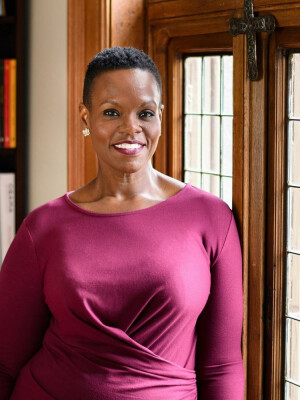Thames brings innovative leadership to role as Dean
By Melissa Lauber
 When she was 14, living in a poor Baptist community in southern Mississippi, the Rev. Dr. Theresa Thames was told that women were simply not permitted to be pastors. “But I didn’t know there were limits,” she said.
When she was 14, living in a poor Baptist community in southern Mississippi, the Rev. Dr. Theresa Thames was told that women were simply not permitted to be pastors. “But I didn’t know there were limits,” she said.
In August, she became the Dean of Religious Life and the Chapel at Princeton University in New Jersey.
It has been a poignant, up-and-down journey to reach this new ministry, where she oversees religious life on the campus, supporting 17 interfaith campus chaplaincies and numerous faith-based student organizations and facilities. Thames, an Elder in the Baltimore-Washington Conference, admits that she has gone through stages in which she wanted to be anything but herself. I compartmentalized, she said. There were times when she tried to speak with a lower voice, to mimic her idea of what leaders should sound like. She once, she admits, went through a stage buying clothes with shoulder pads. But they made her feel stunted.
Over time, “I learned to be myself, without the layers of baggage that were meant to prove how competent I was,” she said. She learned not to “bifurcate,” herself. And, she learned that “owning all my identities, being who we are is generous,” Thames said. “It gives people permission to be themselves.”
Who Thames is, is a new kind of leader – a black woman who embraces self-care, freedom, and yoga, and thrives on helping people find spiritual practices that allow them to see the world through different lenses. At the intersection of faith and identity, she lives a Gospel of creating meaningful relationships and being completely present in the moment.
Leadership, she has discovered, means “finding clarity in our strengths and growing edges, and not letting my ego get in the way so that I equip my people to shine as brightly as they can.”
A significant portion of her thoughts about leadership were formed at Foundry UMC in Washington, D.C, where Thames served for nine years. There is a photo in her office of her, the Rev. Dean Snyder, and the children of Foundry standing on the church steps. “What Foundry gifted me with was a place to put all the theory I learned at seminary into practice. I am forever indebted for the way they taught me about inclusion, social justice in the community and making hard decisions,” she said. “I am who I am because that congregation took a chance on me.”
In a strange way, the hardships that Thames has endured have also shaped her character and leadership because they have created an unshakeable conviction within her that joy is a tool for resistance.
Everyone in Thames’ family, except her nephew, has died, she said – her parents, ex-husband, sister. “That’s a lot of trauma and pain. So, for me, joy is grounded in this place of deep, deep sadness.”
But she also feels immeasurable gratitude for “getting to be alive. I get to live a life my ancestors never imagined,” she said. “Something in me chooses to live this life.”
Therapy, deep practices of prayer, journaling and introspection keep this from veering into toxic positivity. She just, with intention and a sense of the possible, “taps into joy.”
Part of being able to maintain this sense of joy is claiming a beloved community. Thames sometimes worries that the pandemic, social networks, and other cultural factors have made students feel isolated. She cites the Surgeon General’s report on loneliness as an epidemic.
“The only reason, the only way I made it, is that I have been loved so well by so many people,” Thames said. In her new role at Princeton, she’ll continue the work she began in her former position as the associate dean for eight years, to “create a safe, courageous community that allows people to be fully human. It can be messy work,” she said.
But in such a safe environment people can learn new things and see the world in new ways, Thames said. Certainty and absolutes become less important and people “can discover what God is saying now, in this moment.”
For Thames, it’s being called to listen to ruach, the wind or breath of God, “that’s living, and breathing, and still speaking,” -- calling us to move beyond challenges and fear to be a resurrection people.
“This is not about a song or a handclap,” she said. “It’s showing up to the curiosity, and being in touch with what’s happening. We only have this moment, this breath. Every moment is a new moment. … It challenges us all to think again.”

Beautiful article! I am grateful for the gift that is Rev. Dr. Theresa Thames! May you continue to be blessed in life and in ministry!
Most outstanding!